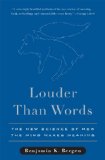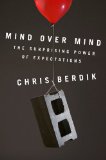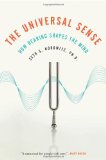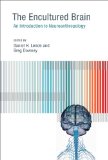new book – ‘Louder Than Words: The New Science of How the Mind Makes Meaning’ by Benjamin K. Bergen
October 15, 2012
Louder Than Words: The New Science of How the Mind Makes Meaning by Benjamin K. Bergen (Basic Books, 2012)
(kindle ed.), (amazon.co.uk – 15 Nov 2012)
Book description from the publisher:
Whether it’s brusque, convincing, fraught with emotion, or dripping with innuendo, language is fundamentally a tool for conveying meaning—a uniquely human magic trick in which you vibrate your vocal cords to make your innermost thoughts pop up in someone else’s mind. You can use it to talk about all sorts of things—from your new labradoodle puppy to the expansive gardens at Versailles, from Roger Federer’s backhand to things that don’t exist at all, like flying pigs. And when you talk, your listener fills in lots of details you didn’t mention—the curliness of the dog’s fur or the vast statuary on the grounds of the French palace. What’s the trick behind this magic? How does meaning work?
In Louder than Words, cognitive scientist Benjamin Bergen draws together a decade’s worth of research in psychology, linguistics, and neuroscience to offer a new theory of how our minds make meaning. When we hear words and sentences, Bergen contends, we engage the parts of our brain that we use for perception and action, repurposing these evolutionarily older networks to create simulations in our minds. These embodied simulations, as they’re called, are what makes it possible for us to become better baseball players by merely visualizing a well-executed swing; what allows us to remember which cupboard the diapers are in without looking, and what makes it so hard to talk on a cell phone while we’re driving on the highway. Meaning is more than just knowing definitions of words, as others have previously argued. In understanding language, our brains engage in a creative process of constructing rich mental worlds in which we see, hear, feel, and act.
Through whimsical examples and ingenious experiments, Bergen leads us on a virtual tour of the new science of embodied cognition. A brilliant account of our human capacity to understand language, Louder than Words will profoundly change how you read, speak, and listen.
Google Books preview:
See also: Author’s webpage







